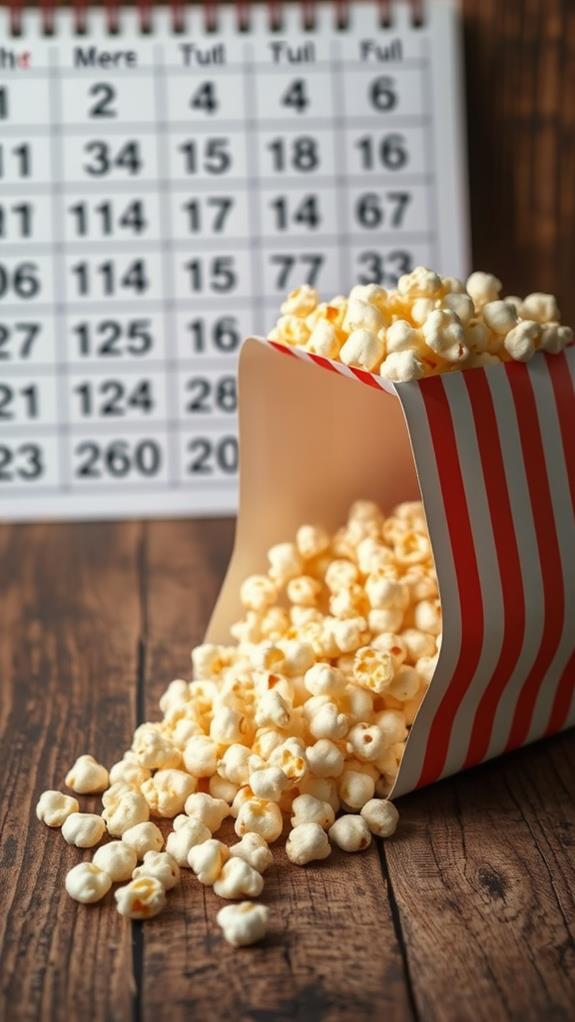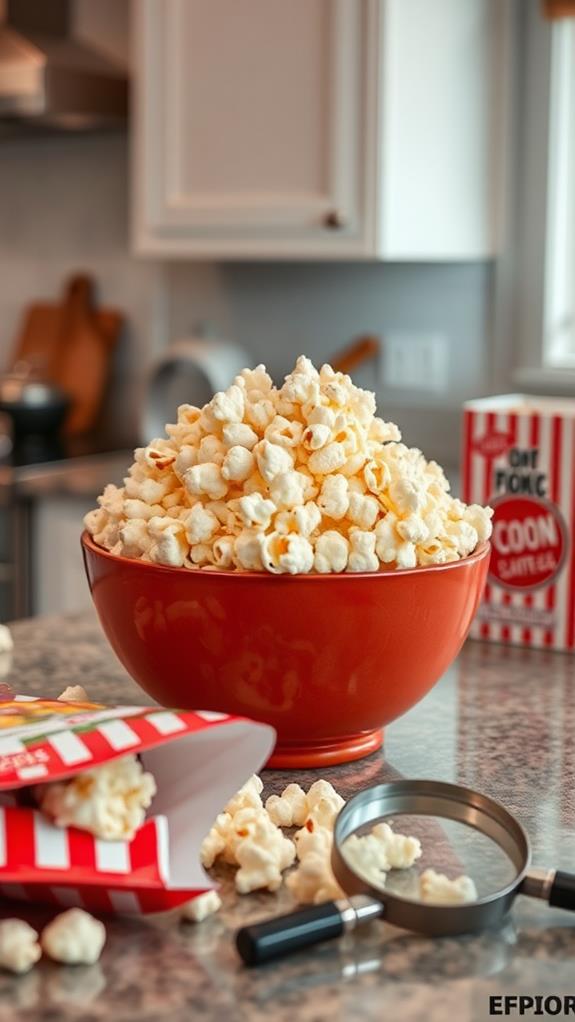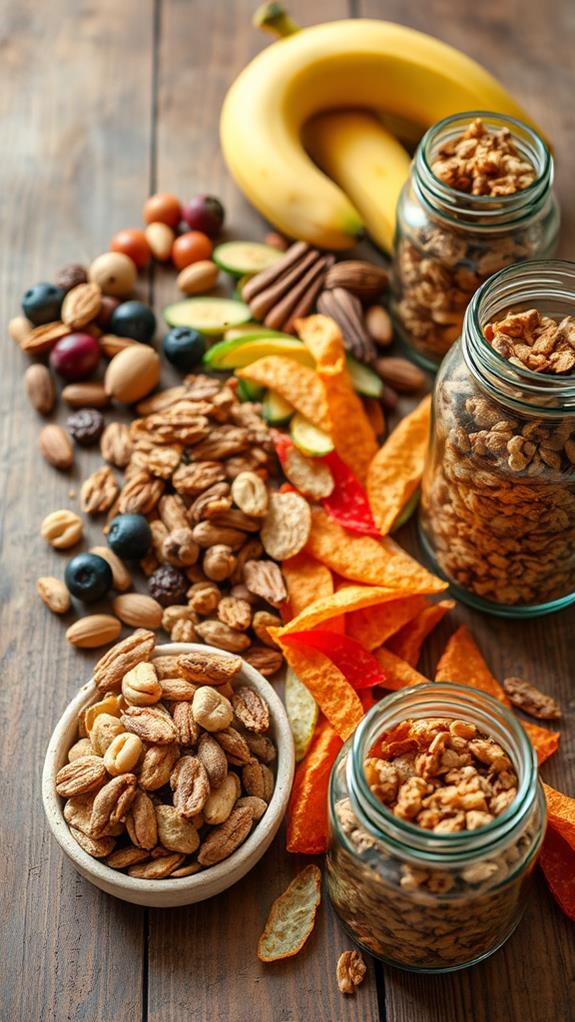Is It Safe to Eat Expired Popcorn
Eating expired popcorn is generally safe if it's been stored properly, but you might notice a decline in quality and taste. The "best by" date indicates peak freshness, not safety. Look for signs of spoilage like mold, pests, or rancid odors before consuming. Unopened popcorn can last 6-12 months past its printed date, while opened packages should be used within 1-2 weeks for ideal flavor. Store your popcorn in a cool, dry place in airtight containers to maximize its shelf life. While the health risks are low, be aware that stale popcorn may become harder and pose a choking hazard. For the best popcorn experience, consider exploring fresh alternatives or proper storage techniques.
This post may contain affiliate links. If you make a purchase through these links, I may earn a commission at no additional cost to you. Additionally, portions of this post may be generated using artificial intelligence (AI) technology. While we strive for accuracy, please be aware that AI-generated content may not always be perfect and should be fact-checked when necessary.
The Spatula Scoops
- Expired popcorn is generally safe to eat if stored properly, but quality may diminish over time.
- Check for signs of spoilage like mold, pests, off-odors, or unusual textures before consuming expired popcorn.
- Unopened popcorn can last 6-12 months past the printed date if stored in a cool, dry place.
- Consuming expired popcorn poses low health risks, but may result in reduced nutritional value or unpleasant taste.
- Stale popcorn can become harder and potentially pose a choking hazard, especially for young children or elderly individuals.
Understanding Popcorn Expiration Dates

Expiration dates on popcorn packages can often be confusing. You'll typically find two types of dates: "best by" and "use by." The "best by" date indicates when the popcorn's quality is at its peak, not when it becomes unsafe to eat. "Use by" dates are more stringent, suggesting you should consume the product before this date for ideal/favorable/desirable safety and quality. Similar to raw ramen noodles, popcorn is generally safe to consume past its expiration date, but the quality may diminish over time.
It's important to understand that these dates are manufacturers' recommendations, not hard deadlines. Popcorn, being a dry good, has a long shelf life. Unopened, it can last 6-12 months past the printed date if stored properly. Once opened, aim to use it within 1-2 weeks for the best taste and texture.
Factors affecting popcorn's longevity include storage conditions, packaging integrity, and moisture exposure. To maximize shelf life, store your popcorn in an airtight container in a cool, dry place. Avoid high humidity areas, as moisture can lead to mold growth or premature staleness. By understanding these expiration guidelines and proper storage techniques, you can make informed decisions about your popcorn's edibility and quality.
Signs of Spoiled Popcorn
Vigilance is key when determining if your popcorn has gone bad. You'll want to look for several telltale signs that indicate your popcorn is no longer safe to consume. First, check for any visible mold growth. If you spot any fuzzy patches or discoloration, it's best to discard the entire package. Similar to inspecting oatmeal, be on the lookout for any signs of pests like beetles or weevils, which can contaminate your popcorn.
Next, give your popcorn a sniff. If you detect any rancid, sour, or off-putting odors, it's a clear indication that the oils in the kernels have gone bad. Fresh popcorn should have a neutral or slightly nutty aroma. Additionally, pay attention to the texture of the kernels. If they feel excessively soft, sticky, or have an unusual consistency, it's time to toss them out.
When popping expired popcorn, be wary of kernels that don't pop or those that only partially pop. This could be a sign of compromised quality. Finally, trust your taste buds. If the popped corn tastes stale, bitter, or simply off, don't continue eating it. Remember, while eating slightly expired popcorn may not cause immediate harm, it's always better to err on the side of caution and prioritize food safety.
Health Risks and Considerations

When it comes to health risks, consuming expired popcorn generally poses a low threat. However, there are some considerations you should keep in mind. While popcorn kernels can last for years when stored properly, popped popcorn can become stale or rancid over time. Similar to uncooked rice risks, expired popcorn may harbor bacteria that could lead to food poisoning if consumed in large quantities.
Mold growth: If exposed to moisture, popcorn can develop mold, which may cause allergic reactions or respiratory issues.
Rancidity: The oils in popcorn can go rancid, leading to an unpleasant taste and potential digestive discomfort.
Reduced nutritional value: Over time, the vitamins and minerals in popcorn may degrade.
Choking hazard: Stale popcorn can become harder and pose a choking risk, especially for young children.
Pest infestation: Old popcorn may attract insects or rodents, which can contaminate the product.
While eating slightly expired popcorn isn't likely to cause serious harm, it's best to consume it within its recommended shelf life for ideal taste and safety. If you notice any signs of spoilage, such as an off smell or visible mold, it's best to discard the popcorn to avoid potential health risks.
Proper Storage for Longevity
To maximize the shelf life of your popcorn and minimize health risks, proper storage is key. You'll want to keep your popcorn in a cool, dry place away from direct sunlight and heat sources. Airtight containers are your best bet for preserving freshness and preventing moisture from seeping in. If you've got unopened, commercially packaged popcorn, it'll typically last longer than homemade or opened varieties.
For unpopped kernels, store them in a pantry or cupboard where temperatures remain consistent. Once you've popped your corn, it's best to consume it immediately. However, if you've got leftovers, place them in a resealable plastic bag or airtight container. Don't leave popped corn out in the open, as it'll quickly become stale and potentially attract pests.
If you're dealing with microwave popcorn, keep the unopened packages in your pantry. Once you've opened a package, transfer any unused kernels to an airtight container. Remember, proper storage isn't just about longevity; it's also about maintaining the popcorn's flavor, texture, and nutritional value. By following these storage guidelines, you'll preserve your popcorn stays fresh and safe to eat for as long as possible.
Alternatives to Expired Popcorn

Despite the allure of your expired popcorn, there are plenty of tasty alternatives you can enjoy. Consider these options that offer similar satisfaction without the risk of consuming stale or potentially unsafe kernels:
- Fresh popcorn: Buy new kernels and pop them yourself for a crisp, delicious snack.
- Air-popped popcorn: A healthier alternative with less oil and fewer calories.
- Microwave popcorn: Convenient and quick, with various flavors available.
- Popcorn seasoning: Sprinkle on plain popcorn for added flavor without extra calories.
- Pre-popped bagged popcorn: Ready-to-eat options in various flavors and textures.
When selecting an alternative, consider factors like nutritional value, convenience, and personal taste preferences. You'll find that fresh popcorn often provides better flavor and texture than expired kernels. If you're looking for a healthier option, air-popped popcorn is an excellent choice. It's low in calories and allows you to control the amount of added seasonings. For those who prioritize convenience, microwave popcorn or pre-popped varieties offer quick solutions. Remember to check expiration dates and storage recommendations for your chosen alternative to maintain freshness and flavor.
Frequently Asked Questions
Can Expired Popcorn Be Used for Non-Food Purposes?
Yes, you can repurpose expired popcorn for non-food uses. You might consider using it as a packing material to protect fragile items during shipping or storage. It's also great for kids' crafts, such as making decorative garlands or filling bean bags. In the garden, expired popcorn can serve as a biodegradable mulch. You could even use it as a natural exfoliant in homemade body scrubs. Remember, while these uses are creative, it's crucial to verify the popcorn isn't moldy or contaminated before repurposing.
Does Microwaving Expired Popcorn Affect Its Safety or Taste?
Microwaving expired popcorn won't necessarily make it safer, but it might affect its taste and texture. You'll likely notice fewer kernels popping and a stale flavor. The heat won't eliminate potential rancidity in old oils, which could cause an unpleasant taste. While microwaving won't introduce new safety risks, it's best to use fresh popcorn for ideal results. If you're concerned about food safety, always check for signs of spoilage before consuming any expired food items.
Are There Different Expiration Considerations for Flavored Versus Plain Popcorn?
Picture a rainbow of popcorn flavors, each with its own unique shelf life. You'll find that flavored popcorn generally has a shorter expiration window than plain kernels. The additives in flavored varieties can break down faster, affecting taste and texture. Plain popcorn, being just kernels, lasts longer. You'll want to check packaging for specific dates, but typically, flavored popcorn stays fresh for 2-3 months, while plain kernels can last up to a year when stored properly. Always use your senses to judge quality.
Can Expired Popcorn Kernels Still Be Planted and Grown?
You can plant expired popcorn kernels, but your success rate may fluctuate. As kernels age, their viability decreases. While some might still germinate, you'll likely see fewer sprouts compared to fresh seeds. Factors like storage conditions and kernel quality also play a role. If you're keen on growing popcorn, it's best to use fresh seeds for ideal results. However, if you're curious, planting expired kernels could be an interesting experiment to see what grows.
How Does Altitude Affect the Shelf Life of Popcorn?
Altitude can affect your popcorn's shelf life due to changes in air pressure and humidity. At higher elevations, you'll experience lower air pressure, which may cause packaging to expand slightly. This can potentially compromise the airtight seal, exposing kernels to more oxygen and moisture. Additionally, humidity levels often decrease at higher altitudes, which could dry out your popcorn faster. To combat these effects, you might consider storing your popcorn in airtight containers and monitoring humidity levels in your storage area.
Conclusion
You've navigated the maze of popcorn expiration, and now you're equipped to make informed decisions. While eating slightly expired popcorn isn't likely to harm you, it's best to err on the side of caution. Always check for signs of spoilage, store your kernels properly, and consider alternatives if you're unsure. Remember, popcorn's quality, like a blockbuster movie, fades over time. By following these guidelines, you'll guarantee your movie nights are both safe and delicious.





